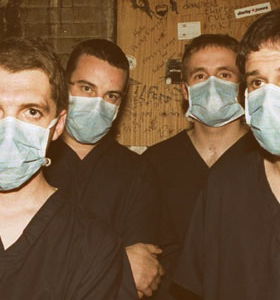Wednesday, February 18, 2026 |
||

CLINIC: What's Behind Those Surgical Masks? Taking the pulse of the cool British export Interview Yancey Strickler Photography Brendan Colthurst |
|

Clinic (from left: Ade Blackburn, Brian Campbell, Carl Turney and Hartley) Carl Turney: "In our experience, the more produced an album becomes, the more un-spontaneous it becomes. It becomes really bland." |
New York - October 9, 2001
Clinic singer Ade Blackburn's voice hiccups, squeals and coos, like a child just learning how to talk. Lyrics consist of unintelligible gibberish like "Tikki tikki tomononow." During a rare moment of clarity, Blackburn sings, "I picture you in coffins/ My baby in her coffin," and considering the sweetness of the melody, you have to wonder if he understands the words he sings. But even if his handle on English is suspect, his band's musical semantics are spot on. Clinic approach music academically; they study it, learn from it and apply its best features to their own craft. But instead of evincing collegiate stuffiness, Clinic are more like a wide-eyed, frizzy-haired physics professor whose pulse races at the sight of an equal sign. Formed in 1997, Clinic — drummer Carl Turney, bassist Brian Campbell, keyboardist/guitarist Hartley and singer/guitarist Blackburn — began releasing frantic singles on their own Aladdin's Cave label in the UK. Their first record, "I.P.C. Subeditors Dictate Our Youth," obliquely took the NME's obsessive press force to task. The piercing tones and layered rhythms of the organ-driven song got the attention of BBC DJ John Peel and Domino Records, and in 1999 Domino reissued the group's handful of singles on one CD. While England was swooning to the grandiose tunes of Radiohead and Travis, Clinic's stripped-down sounds went largely unnoticed. But the group's debut album, Internal Wrangler, released in May 2000 in the UK and September 2001 in the U.S., toned down the staccato feel, adding substantial tempo dynamics. The broader scope earned much praise, as well as a tour-opener slot from harbingers of hip Radiohead, who declared Clinic one of their favorite bands. Clinic's music is a mish-mash of marginalized musical styles. The emphatic rhythms are culled from early funk and Afrobeat performers like Fela Kuti, yet the abrupt guitar downstrumming is decidedly white. The omnipresent organ riffs, which as the group admits owe much to the Velvet Underground's "Sister Ray," confuse things even more, but songs rarely run over four minutes. Each era and branch of rock is represented in their sound — rockabilly and country guitar licks from the '50s, fuzzed-out organs from the '60s, funk from the '70s and post-punk melodies from the '80s. The '90s don't get represented; as Blackburn remarked after the interview, there is nothing to learn from one's contemporaries. February brings Walking With Thee, the group's anticipated follow-up to Internal Wrangler. The songs are essentially the same — taut and filled with unexpected melodies — but the driving force of their earlier work, the Can-esque sense of rhythm, has been de-emphasized, continuing Clinic's evolution from frenzied singles to the more mature Internal Wrangler. Even the group's recording capabilities have grown with Walking With Thee. The studio blips and seemingly accidental sounds that dotted Internal Wrangler have been replaced with a fuller tone. Though a relatively youthful band, these Velvet Underground fans have already recorded their Loaded. The band's new emphasis on professionalism should help attract fans who may have been dissuaded by their past DIY ethos. Clinic haven't abandoned their organic sound, though; they've just gotten better at doing it themselves. When photographer Brendan Colthurst and I met the band at Maxwell's in Hoboken, N.J., they greeted us warmly. I spoke with singer/guitarist Blackburn and drummer Turney in the band's dressing room. Blackburn's diminutive frame and sharp features matched his soft-spoken nature and quick wit, while Turney was much more earnest, his wide eyes emphasizing each point pleadingly. The band changed into their surgical uniforms for the following photo shoot, but mercifully not for our conversation (apparently sanitation regulations aren't a factor — the scrubs reeked of mildew). And contrary to a friend's hypothesis, the doctor getups are not employed to conceal shoddy Brit dentistry. On the rare occasion that Blackburn and Turney flashed a grin, their pearlies appeared to be in fine order. Strickler: Did Internal Wrangler come out the way you heard it in your head? Ade Blackburn: I don't think anything we've ever done ever comes out quite how you hear it in your head, but I think it came quite close. After we'd done the singles ourselves, one route we could have taken was to go for a really slick, polished, proper first album. I just don't think that really fit with what we wanted to do at the time. Being on Domino meant that we could just do something that was sufficiently unusual to fit in with what we were going for. Carl Turney: In our experience, the more produced an album becomes, the more un-spontaneous it becomes. It becomes really bland, and we get bored with the songs quite easily anyway. We're trying to capture that spontaneous energy all the time. Big productions tend to quash the spark that's there when you first hear a song in the rehearsal room or first hear it on the four-track where it's got that little bit of something. |